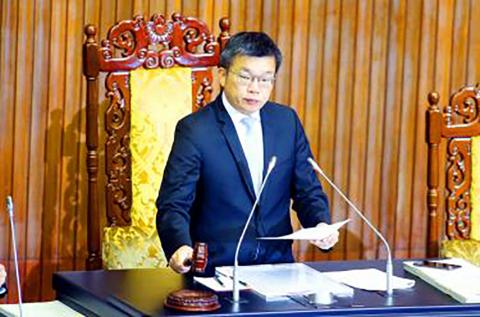Democratic Progressive Party (DPP) lawmakers yesterday decried an alleged Chinese investigation into political donations made by Taiwanese businesses that operate in China, saying that the democratic value of transparency should not be used for political oppression.
The Chinese government is allegedly looking into whether Taiwanese corporations with operations in China have donated to the pan-green camp — which in Taiwan is public information — and aims to have the firms make “political statements” akin to that made by Taiwan-based cafe and bakery chain 85°C (85度C), a source said yesterday.
The cafe on Aug. 15 declared its support for the so-called “1992 consensus” and the peaceful development of cross-strait ties when Chinese netizens threatened to boycott the chain after one of its branches in Los Angeles allegedly gave President Tsai Ing-wen (蔡英文) a gift package while she was en route to Paraguay and Belize.

Photo: CNA
Some Taiwanese corporations have already approached pan-green politicians and legislators “seeking help,” the source said.
Asked for comment, Deputy Legislative Speaker Tsai Chi-chang (蔡其昌) said: “While we encourage the transparency of political donations to civil servants, the identity of Taiwanese corporations in China that make donations should be protected.”
Beijing intrusions just deepen Taiwanese loathing for China and such actions “are ill-willed acts to undermine cross-strait development,” he added.
Information made public under the Political Donations Act (政治獻金法) should not make donors a target of political suppression, DPP Legislator Lai Jui-lung (賴瑞隆) said.
Any such action seeking to counter democratic values and influence economic activity should be condemned, Lai said.
The 85°C incident serves as a lesson on Chinese intrusion into the private affairs of companies and Beijing continuing the practice as a way to oppress Taiwanese corporations in China would only further alienate Taiwanese, he said.
National security-related agencies should have a stronger response to political threats made by an authoritarian China against Taiwan’s democracy, Lai said.
Domestic political parties should not collude with China to oppress Taiwanese democratic values, which were hard-fought and could be lost if allowed to slip away, Lai added.
The declaration of political donations should not lead to donors’ right to privacy being breached, a DPP party official said on condition of anonymity, adding that the information should only be revealed if criminal activity is suspected, or in other “special” circumstances.
Asked whether the alleged breach by China would result in fewer donations to the pan-green camp, DPP Legislator Kuan Bi-ling (管碧玲) said the move by Beijing would be ineffective and only cause China to lose further support in Taiwan, while DPP Legislator Tsai Yi-yu (蔡易餘) said it would not only fail to cut off funding for the party, but also “help the campaigns of pan-green candidates.”
DPP Legislator Rosalia Wu (吳思瑤) said the alleged Chinese actions were absurd and constituted a direct intrusion into Taiwanese politics and elections, adding that such actions would only have adverse effects.

Tropical Storm Gaemi strengthened into a typhoon at 2pm yesterday, and could make landfall in Yilan County tomorrow, the Central Weather Administration (CWA) said yesterday. The agency was scheduled to issue a sea warning at 11:30pm yesterday, and could issue a land warning later today. Gaemi was moving north-northwest at 4kph, carrying maximum sustained winds near its center of up to 118.8kph and gusts of 154.8kph. The circumference is forecast to reach eastern Taiwan tomorrow morning, with the center making landfall in Yilan County later that night before departing from the north coast, CWA weather forecaster Kuan Shin-ping (官欣平) said yesterday. Uncertainty remains and

SEA WARNING LIKELY: The storm, named Gaemi, could become a moderate typhoon on Wednesday or Thursday, with the Taipei City Government preparing for flooding A tropical depression east of the Philippines developed into a tropical storm named Gaemi at 2pm yesterday, and was moving toward eastern Taiwan, the Central Weather Administration (CWA) said. Gaemi could begin to affect Taiwan proper on Tuesday, lasting until Friday, and could develop into a moderate typhoon on Wednesday or Thursday, it said. A sea warning for Gaemi could be issued as early as Tuesday morning, it added. Gaemi, the third tropical storm in the Pacific Ocean this typhoon season, is projected to begin moving northwest today, and be closest to Taiwan on Wednesday or Thursday, the agency said. Today, there would likely

DISRUPTIONS: The high-speed rail is to operate as normal, while several airlines either canceled flights or announced early departures or late arrivals Schools and offices in 15 cities and counties are to be closed today due to Typhoon Gaemi, local governments announced last night. The 15 are: Taipei, New Taipei City, Taoyuan, Tainan, Keelung, Hsinchu and Kaohsiung, as well as Yilan, Hualien, Hsinchu, Miaoli, Chiayi, Pingtung, Penghu and Lienchiang counties. People should brace for torrential rainfall brought by the storm, with its center forecast to make landfall on the east coast between tonight and tomorrow morning, the Central Weather Administration (CWA) said. The agency issued a sea warning for the typhoon at 11:30pm on Monday, followed by a land warning at 11:30am yesterday. As of

CASUALTY: A 70-year-old woman was killed by a falling tree in Kaohsiung as the premier warned all government agencies to remain on high alert for the next 24 hours Schools and offices nationwide are to be closed for a second day today as Typhoon Gaemi crosses over the nation, bringing torrential rain and whipping winds. Gaemi was forecast to make landfall late last night. From Tuesday night, its outer band brought substantial rainfall and strong winds to the nation. As of 6:15pm last night, the typhoon’s center was 20km southeast of Hualien County, Central Weather Administration (CWA) data showed. It was moving at 19kph and had a radius of 250km. As of 3pm yesterday, one woman had died, while 58 people were injured, the Central Emergency Operation Center said. The 70-year-old